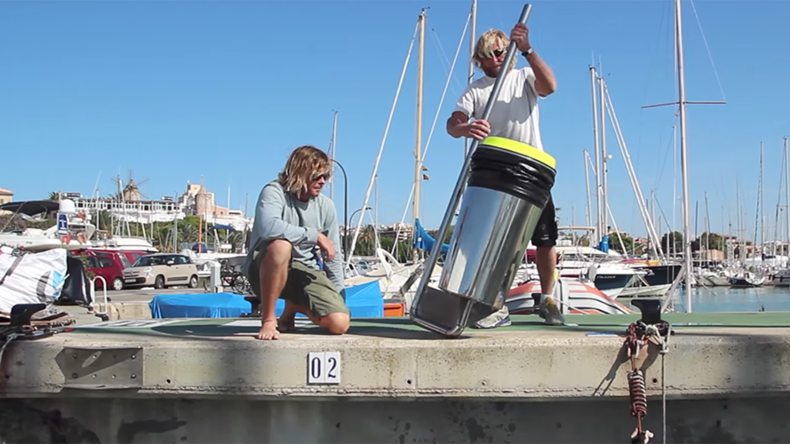Floating trash bin gets to work on UK’s south coast

A revolutionary new invention known as the ‘Seabin’ has already begun the mammoth task of unclogging waste from our seas.
The brainchild of Australian surfers Pete Ceglinski and Andrew Turton, the Seabin was installed for the first time near the base of the Land Rover Ben Ainslie Racing (BAR) sailing team in Portsmouth on the UK’s south coast.
The team introduced the plastic-gathering invention as part of its bid to become “the most sustainable sailing team in the world.”
Seabins looking good at @portadriano1 tonite! pic.twitter.com/XP8DeYaA2M
— Seabin_project (@Seabin_project) October 2, 2017
The machine, which can only be used around ports, marinas and yacht clubs, uses a submersible pump to suck waste in from the surface of the water into the bin’s inner bag.
READ MORE: Ingenious ocean-cleaning ‘bin’ from 2 Aussie surfers crowdfunds over $250k (VIDEO)
Getting through a workload of 1.5kg (3.3lbs) of waste per day, the bin can hold up to 12kg (26lbs) before needing to be emptied. This means the Seabin can collect waste amounting to more than 20,000 plastic bottles or 83,000 plastic bags per year.
“It catches everything floating in the water, plastic bottles, paper, oil, fuel and detergent,” Ceglinksi said.
The entrepreneurial pair needed to crowdfund AU$50,000 to begin production, but such was the public’s appetite for the project, they managed to raise the total amount raise a total of $267,000. They later trialled the Seabin at various marinas across Europe.
The Seabin currently costs around ASU$5,000 to buy, and Ceglinski and Turton hope to manufacture up to 360 a month when their factory in Lyon, France, is fully operational.
READ MORE: 1 ton of plastic produced for every person on planet, scientists reveal
As part of its sustainability push, the BAR team placed the Seabin alongside 1,000 oysters houses in protected cages on the team pontoon. The oysters were introduced in 2015 as part of a local conservation project.
The problem of plastic production has been raised often in recent times. In July, US scientists estimated that a total of 8.3 billion tons (metric) of plastic have been produced over the course of history, enough to cover a country the size of Argentina, and a ton of plastic for every person on the planet.
In 2016, a report from the Ellen MacArthur Foundation predicted that by 2050 there would be more plastic than fish in the sea.













